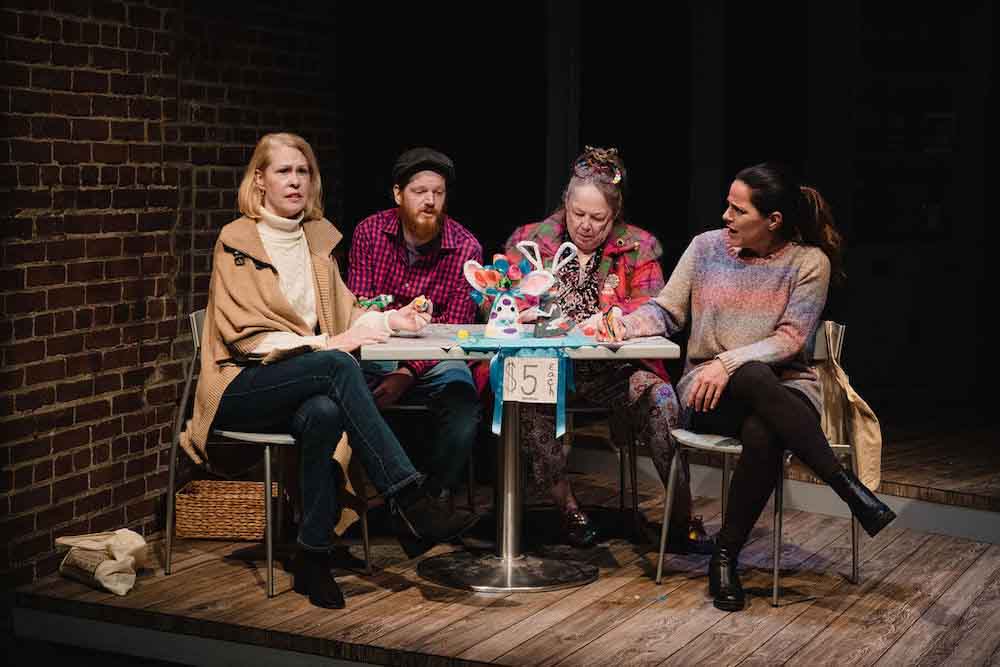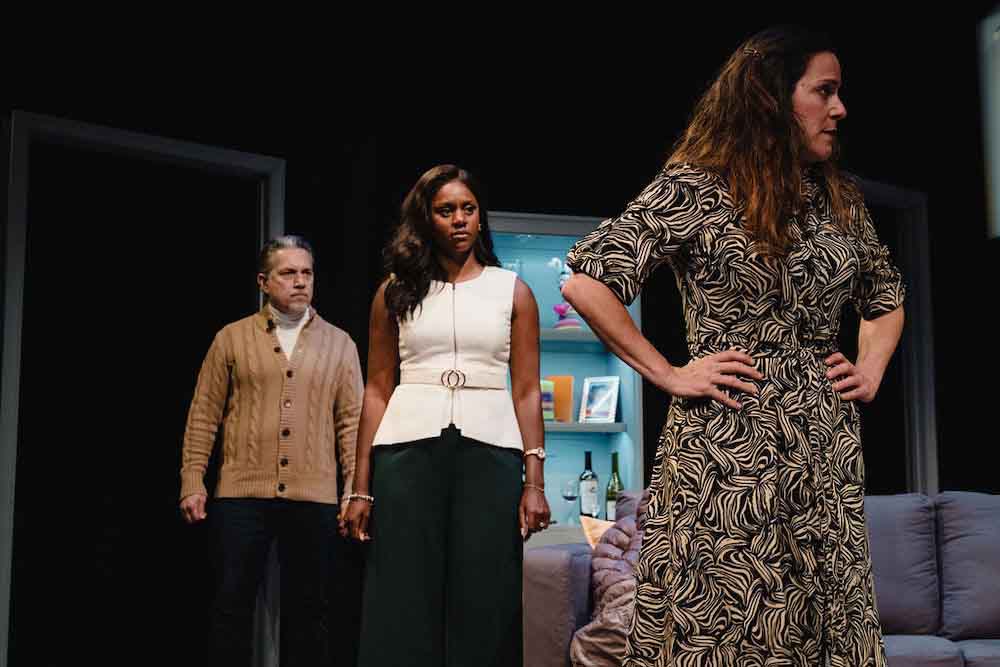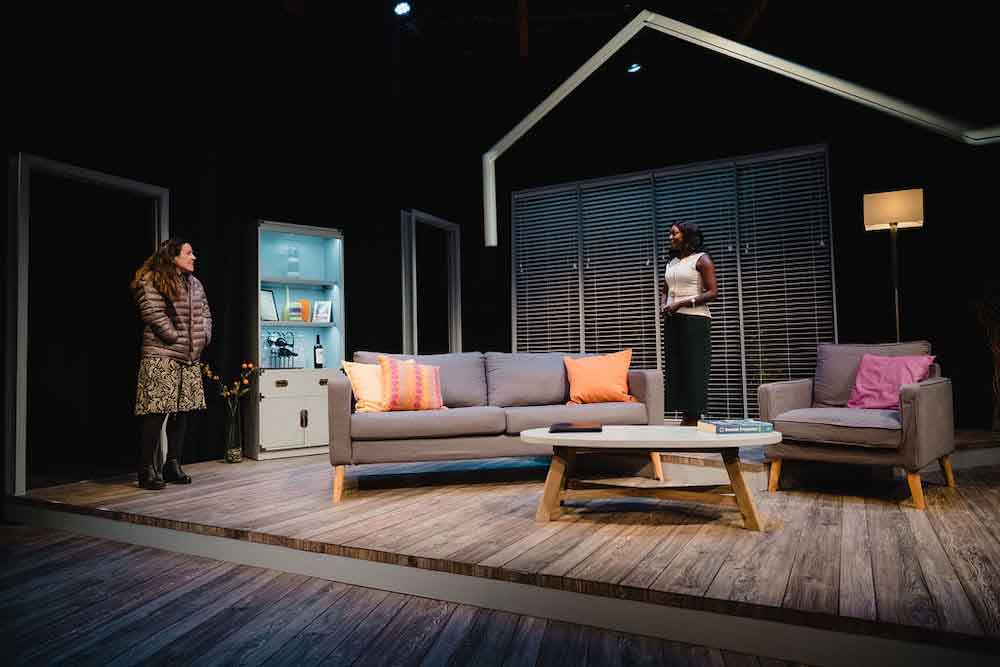The Keegan Theatre kicks off its 25th anniversary season this year. Their first production, David Lindsay-Abaire’s Good People, is a blazing success and a welcome reminder that misfortune can bring with it unexpected gifts.
Our heroine, Margaret (“Margie”), is played superbly by Susan Marie Rhea, artistic director of Keegan. Margie is in a situation many faced in the pandemic: multiple disasters she didn’t predict, can’t control, and is struggling to master. She grew up in South Boston, didn’t go to college, and has a severely developmentally disabled adult daughter. Her job options are limited and she is on her own. She is not without resources, however; she has spirit, a sharp sense of humor, and an irrepressible if not notably sensible group of friends.

Jean (Sheri S. Herren) offers what she considers practical tips. Dottie (Linda High), who is also her landlady, is obviously devoted to Margie despite her constant complaints about late rent. Stevie (Joe Baker), whom we meet when he is reluctantly firing her, turns out to be a better friend to Margie than we thought. And Margie has a past: in high school she dated a fellow Southie, Mike (Mike Kozemchak), who is now a doctor, more or less happily married, and now lives in upscale Chestnut Hill.
David Lindsay-Abaire’s play is tonally deeply attuned to the ways people from disparate backgrounds interact and feel. Director Josh Sticklin’s approach has a musical lilt to it; the speech and silences have a striking and melodic rhythm, and he brings out the best in his actors.
Margie, like many of us in crisis, doesn’t behave particularly well. And some of her prejudices are disturbing. But Rhea’s formidable performance keeps us watching. Simone Brown as Mike’s wife, Kate, is wonderfully perceptive; Kate, who teaches literature, is far more sophisticated than Margie. Kate is presented as one of the “good people” of the title; yet, as Brown makes clear, she is no more immune to self-doubt than anyone else.
Mike Kozemchak’s Mike is in an unenviable position—between two women who both have certain claims on him, however diffuse in Margie’s case. He valiantly tries to take the high road, fails, tries again, and fails again. We can feel his past connection with Margie, as well as his deep, if conflicted, love for his wife.
Mike gives to charities that are sufficiently detached from his own life not to arouse any confusing emotions. Mike and Kate are “comfortable.” Margie, with her real and pressing problems, presents a challenge they simply aren’t used to, and they react in characteristic ways.

The subject of race is handled with palpable seriousness, causing discomfort all around. The intersectionality of race, class, and gender is an important part of the play’s message. This season, the company is partnering with the Arlington-based organization Challenging Racism to support education on the prevalence of discrimination and provide tools to challenge hatred. Good People will do much to energize that dialogue.
Class causes tensions between Margie and Mike. She derides him as snooty, “lace-curtain” Irish. To her mind, in some respects she didn’t have choices. Mike tends to believe his success was due to his hard work, and his, well (let’s be honest), intellectually superior choices.
Some seem to believe that people who are “down on their luck” are simply somehow at fault. And yet is Mike to blame for taking pride in his personal accomplishments? And what about Margie? Did she really have choices, or not?

The set, by Matthew J. Keenan, is attractive and evokes everything from a doctor’s office to Mike’s home in Chestnut Hills. Shadia Hafiz’s costumes enhance our understanding of character and class differences. Lighting Designer Alberto Segarra and Sound Designer Dan Deiter’s work confirms the overall effect of technical excellence. Special mention is due to the very fine hair and makeup work of Tiesha Cooper, Dialect Designer Lisa Nathans, Dialect Coach Zach Campion, and Properties/Set Dressing Designer Cindy Landrum Jacobs.
It is great to see people live on stage again, and to experience that magical connection. Don’t miss Good People. It will bring you straight to the essence of what it is to be human, right here, right now.
Running Time: Two hours, with one 15 minute intermission.
Good People plays through October 3, 2021, at the Keegan Theatre – 1742 Church Street, NW, Washington DC. For tickets, call the box office at (202) 265-3767 or go online.
To learn about the Keegan Theatre’s policies and procedures around keeping patrons, artists, and staff safe and healthy this season, visit their Health & Safety page.
As part of a season-long partnership, Challenging Racism and the Keegan Theatre have prepared an educational document, downloadable here, designed to encourage conversation and thought around race and its intersection with other themes presented in Good People.
Good People by David Lindsay-Abaire
PRODUCTION TEAM
Director Josh Sticklin
Assistant Director/Dramaturg: Douglas Dubois-Card Sebamala
Stage Manager: Shee Shee Jin
Lighting Designer: Alberto Segarra
Sound Designer: Dan Deiter
Dialect Designer Lisa Nathans
Set Designer/Master Carpenter: Matthew J. Keenan
Properties/Set Dressing Designer: Cindy Landrum Jacobs
Costume Designer: Shadia Hafiz
Hair/Makeup Designer: Tiesha Cooper
Dialect Coach/Voice of Priest: Zach Campion
CAST
Margaret: Susan Marie Rhea
Stevie: Joe Baker
Dottie: Linda High
Jean: Sheri S. Herren
Mike: Mike Kozemchak
Kate: Simone Brown




